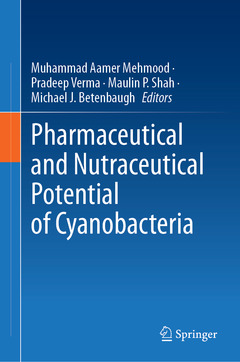Description
Pharmaceutical and Nutraceutical Potential of Cyanobacteria, 2024
Coordinators: Mehmood Muhammad Aamer, Verma Pradeep, Shah Maulin P., Betenbaugh Michael J.
Language: English
Subjects for Pharmaceutical and Nutraceutical Potential of Cyanobacteria:
356 p. · 15.5x23.5 cm · Hardback
Description
/li>Contents
/li>Biography
/li>Comment
/li>
Chapter 1. Cyanobacterial Cell Factories; Insight into Their Pharmaceutical and Nutraceutical Properties.- Chapter 2. Cyanobacterial Pigments: Pharmaceutical and Nutraceutical Applications.- Chapter 3. Spirulina as a Food of the Future.- Chapter 4. Potential of Cyanobacterial Biomass as an Animal Feed.- Chapter 5. Cost-Effective Cultivation of Cyanobacteria for Biotechnological Applications.- Chapter 6. Storage, Processing, and Stability of Phycobilins.- Chapter 7. Non-Conventional and Novel Strategies to Produce Spirulina Biomass.- Chapter 8. Cyanobacteria-based Green Synthesis of Nanoparticles for Industrial Applications.- Chapter 9. Cyanobacterial Bioactive Compounds; Synthesis, Extraction, and Applications.- Chapter 10. Threats, Challenges, and Issues of Large-Scale Cyanobacterial Cultivation.- Chapter 11. Cyanobacterial Exopolysaccharides; Extraction, Processing and Applications.- Chapter 12. Innovations in the Cyanobacteria-Based Biorefineries for Biopharmaceutical Industries.- Chapter 13. Cyanobacteria Biotechnology: Challenges and Prospects.- Chapter 14. Global Research Trends in Cyanobacteria; Bioproducts and Culture Collection.
Prof. Dr. Muhammad Aamer Mehmood earned his Ph.D. from Quaid-i-Azam University, Islamabad, Pakistan in 2010. He has teaching & research experience spanning more than 12 years as a regular faculty member at Government College University Faisalabad (GCUF), Pakistan. Besides, he has research experience at the Third Institute of Oceanography (Xiamen, China), Sichuan University of Science & Engineering (Zigong, China), & Shanghai Jiaotong University (Shanghai, China).
Currently, he is working as a Professor and Lead-PI of the BioEcoTech Research Cluster at the Department of Bioinformatics and Biotechnology. He has been working on process optimization for the sustainable utilization of bio-resources with a special focus on microalgae and cyanobacteria, wastewater recycling, and biomass-to-bioenergy conversion through pyrolysis and bioprocessing since 2010. His research projects involve bioprospecting and characterization of microalgae/cyanobacteria in a multiproduct biorefinery paradigm to produce bioproducts (biofertilizers, industrial enzymes, biopolymers) while keeping the Energy-Water Environment nexus sustainable.
He has received research funding from the Higher Education Commission, in Pakistan, the International Foundation for Science in Sweden, The World Academy of Sciences in Italy, and the National Natural Science Foundation of China. He has authored/co-authored hundred (100) research & review articles (with ~563 Impact Factor) in peer-reviewed journals and eleven (11) book chapters. For his contributions to the field, He was awarded the Research Productivity Award (one of the most prestigious academic awards in Pakistan) for the years 2011, 2012, and 2014 by Pakistan Council for Science & Technology, and Young Leaders Award 2017 by Positive Pakistan. Moreover, in 2019, he was honored with the highest province-level academic title <




